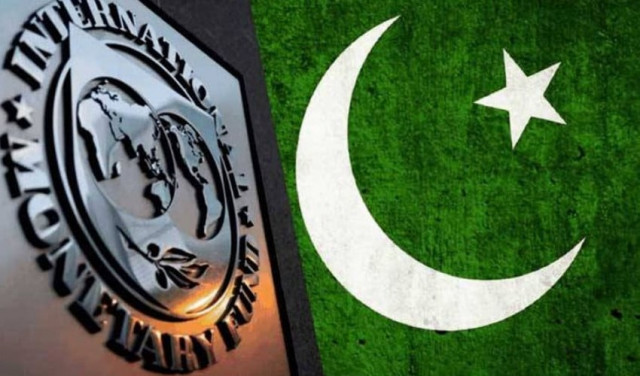Govt fails to amend wealth fund law
IMF seeks changes in Act to bring transparency, ensure competitive process for SOE sales

The government could not meet a major condition of the International Monetary Fund (IMF) to rewrite the Pakistan Sovereign Wealth Fund Act by the end of December aimed at bringing transparency in its governance and fiscal affairs.
The finance ministry had agreed in writing with the IMF that by December 2024 it would amend the Act. The IMF has raised objections to the governance structure and the legal mandate of the sovereign fund to directly sell assets of the state to foreign nations without a competitive process. Ministry of Finance spokesman Qumar Abbasi confirmed to The Express Tribune that the law could not be amended till the deadline. But he added that extensive work on the draft of the legislation had already been done.
"We are finalising the necessary amendments to bring the sovereign wealth fund law in line with the best international practices and have been sharing progress with the IMF," said Abbasi. It is the third IMF condition that the government has so far missed after failing to collect taxes worth Rs6.009 trillion and Rs23.4 billion from traders by the end of December. The IMF will review the implementation status during the first programme review talks expected in this quarter.
Sources said that legal amendments could not be introduced due to differences between the IMF and the finance ministry over the mode of those changes. They said that the government saw no need to bring legal amendments for the governance structure, which could be done through rules and regulations.
However, the IMF has not accepted the government's viewpoint and asked it to stick to the commitments. Pakistani authorities had conceded to the IMF demands to pave the way for a staff-level agreement. To a question about fulfilling the IMF requirements either through a law or rules, Abbasi said "these are small technicalities and are being sorted out".
The Pakistan Democratic Movement (PDM) government enacted the Pakistan Sovereign Wealth Fund Act in 2023 to transfer shares of seven profitable entities in the first phase and then sell them overseas to raise money. These entities include Oil and Gas Development Company, Pakistan Petroleum Limited, Mari Petroleum, National Bank of Pakistan, Pakistan Development Fund, Government Holdings (Private) Limited, and Neelum-Jhelum Hydropower Company. The IMF had initially proposed end-October deadline to amend the law but on the request of the finance ministry the end-December deadline was set, said the sources.
In his letter of Intent written to the IMF managing director for the sake of a $7 billion package, Finance Minister Muhammad Aurangzeb stated, "In particular, key targets of our programme include fully implementing our SOE governance framework across all SOEs, enhancing the Sovereign Wealth Fund's governance, advancing other governance and anti-corruption reforms".
In its programme approval report, the IMF staff highlighted "the need to ensure a level playing field with regard to the investment environment and avoid a watering down in governance standards" with regard to the establishment of a Sovereign Wealth Fund. The staff underlined that the issue remained to be addressed.
The amendments in the Sovereign Wealth Fund law are part of the IMF agenda of bringing "SOE reforms for reducing losses, improving services, and scaling back the role of the state".
The IMF's objective is that amendments in the 2023 Sovereign Wealth Fund Act would ensure that SOEs under the ownership of the Sovereign Wealth Fund revert to the SOE Act's governance structures. These amendments would also ensure that the sovereign fund itself comes under governance mechanisms and safeguards in line with its principal nature as a holding company.
Sources said that the IMF wants the State Bank of Pakistan to be prohibited from lending money to the fund, and the sovereign wealth fund should be banned from providing loans to any government entity. The existing law allows the central bank to lend money to the sovereign fund, but the government has agreed to cease central bank contributions or lending to the fund. The global lender also desired that the sovereign wealth fund should be restricted to selling its owned and controlled companies only through international competitive bidding and abandon any negotiated sales. In yet another major change, the IMF has desired that the wealth fund cannot retain revenues, which should be surrendered to the national exchequer.
Earlier, the finance ministry agreed to omit Section 50 from the Act, applying the State-Owned Enterprises (SOEs) Act 2023 to the seven companies being owned by the Fund. The existing law exempts the state-owned enterprises majority owned by the fund from the SOE Act. Pakistan had also committed to amending all relevant sections of the law that deal with the objectives, businesses, governance, sources of revenue, withdrawal of funds, and public asset management of the wealth fund.
Sources said that the government now wanted these changes to be made through rules instead of a binding law. Currently, the fund is empowered to handle the sale and purchase of domestic and foreign equity securities, debt securities, derivatives, commodities, and other financial assets. It can also enter agreements as a private party or implementing agency in public-private partnerships, and it can acquire, own, sell, or transfer any tangible and intangible, movable or immovable assets.
The existing law permits the sovereign fund to participate in the privatisation process to acquire ownership of state-owned enterprises or provide financial advisory services in the privatisation process. However, after the new amendments, all these rights will be terminated. According to sources, under the Pakistan-IMF deal, the sovereign fund will not be entitled to become a private partner in any public-private partnership venture and will not participate in any privatisation process. Additionally, the fund will surrender all revenues received from its operations or from dividend payments directly to the government.


1733130350-0/Untitled-design-(76)1733130350-0-208x130.webp)















COMMENTS
Comments are moderated and generally will be posted if they are on-topic and not abusive.
For more information, please see our Comments FAQ